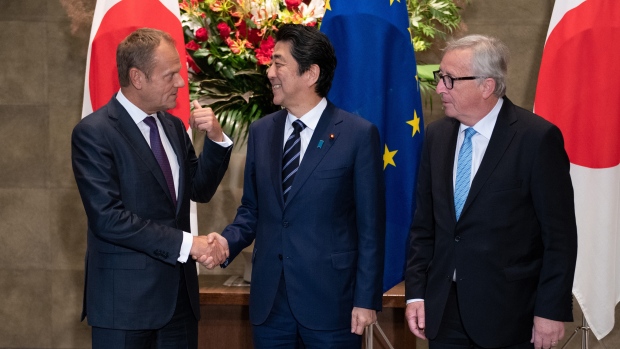Jul 17, 2018
Japan, EU sign trade pact as Trump rattles allies
, Bloomberg News

Japan and the European Union signed a trade agreement on Tuesday in Tokyo that lowers barriers on the movement of goods and services between the two economies and provides a counterweight to U.S. protectionism.
The Economic Partnership Agreement will remove a wide range of duties and regulatory obstacles between the EU and Japan, helping Japanese car exports and making it easier for European farmers to sell their produce in the Asian nation. Japanese Prime Minister Shinzo Abe, European Commission President Jean-Claude Juncker and European Council President Donald Tusk signed the pact, which had been under negotiation since 2013.
Europe and Japan are rallying to bolster multilateral agreements as U.S. President Donald Trump shuns such pacts and imposes tariffs on trading partners. Japan took a leadership role in preserving an 11-member Trans-Pacific deal after Trump pulled the U.S. out immediately after taking office. The EU is joining with Asia’s biggest economies to defend the global trading system from attacks by Trump, who over the weekend suggested the 28-member bloc was the U.S.’s biggest foe globally.
In Beijing on Monday, the EU agreed with China on a joint summit statement for the first time in three years as they sought to set aside differences and show support for a multilateral approach to solving world problems.
Meanwhile, Japan is also in talks with China, India and other Asian countries to create the 16-nation Regional Comprehensive Economic Partnership, which could become the world’s largest trading bloc.
JAPAN'S EXISTING AND POTENTIAL TRADE PACTS
The Japan-EU trade agreement is expected to boost Japan’s economy by about one per cent, or five trillion yen (US$44 billion), and add roughly 290,000 jobs in the nation, according to Japan’s Ministry of Foreign Affairs.
A 10-per-cent import duty on cars from Japan will be phased out over the course of eight years after the deal takes effect, the ministry said. That contrasts with the possibility that the U.S. president invokes national security risks to impose 25-per-cent tariffs on Japanese car imports.
European exporters to Japan will see the vast majority of one billion euros (US$1.2 billion) of duties they pay annually removed, benefitting producers of cheese, wine, beef and pork, according to the European Commission.
The aim is for the deal, which will be the EU’s biggest-ever commercial agreement, to take effect by late 2019. It is awaiting approval by EU governments and by the European Parliament, which is likely later this year. Japan’s parliament also needs to approve it.
The EU has acted against U.S. duties on foreign metals, imposing tit-for-tat tariffs in June on 2.8 billion euros of imports of American goods ranging from motorcycles to orange juice. It has complained to the World Trade Organization, and it is seen ready to retaliate should the U.S. hike tariffs on cars.
Europe is also mulling some measures to appease Trump. The European Commission has proposed ways to address U.S. concerns over the functioning of the WTO, according to an internal memo drafted by the EU’s executive arm and seen by Bloomberg.
The commission offered several ways to fix the WTO dispute system, including increasing the number of appellate body members from seven to nine, and respond to U.S. concerns that the panel has overstepped its mandate.
Japan has stopped short of retaliating against the U.S., but notified the WTO in May that it reserves the right to impose tariffs on up to 50 billion yen worth of U.S. goods in response to U.S. metal tariffs.
On Tuesday, Japan and the EU also signed a strategic partnership agreement that will reinforce cooperation in fields including security, cyber crime and climate change.
With assistance from Jonathan Stearns




